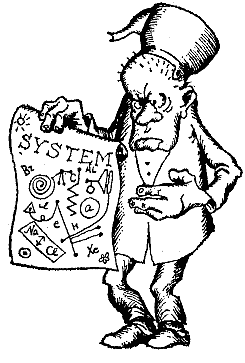107Stories About ChemistryINDEX |
11.
Another Inconsistency?
What Is to Be Done About It? It is said that once a pensive man walked into a research institute with a well stocked folder under his arm. He spread out his papers before the scientists and declared in a tone that suffered no objection: �The Mendeleyev Table should have only seven groups of elements, neither more nor less!� �How is that?� asked the worldly wise scientists in surprise. �It�s very simple. The number �seven� conceals a profound meaning! There are seven colours in the rainbow, seven notes in the musical scale��  It was clear to the scientists that the man before them was not quite sane. And they attempted to turn the claims of the latter-day remaker of Mendeleyev�s Table to joke. �Don�t forget that there are also seven holes in a man�s head!� said one of them with a smile. �And seven pillars of wisdom too,� added another. This is no anecdote. It actually occurred in one of the Moscow institutes. There have been multitudes of such cases in the history of the Periodic System. Attempt after attempt was made to recarve it. Sometimes the attempt had some definite sense. But most often they were just the result of some authors trying to be original. Mendeleyev�s great discovery celebrated its hundredth anniversary in 1969. And to think that in the wake of this great date even serious chemists are coming to the conclusion that something will have to be changed in the Periodic System! There was a time when scientists could not bring themselves to call the elements of the zero group chemical. Now it is the other way around. It seems rather inconvenient to call the elements of the zero group inert. Hardly a month passes but several articles appear in chemical journals on the chemistry of the inert � sorry, the elements of the zero group. Information keeps streaming in from various countries on the synthesis of new chemical compounds of krypton, xenon and radon. Bi-, tetra-, and hexavalent xenon, tetra�valent krypton - these terms, which seemed crazy only decades ago, have now become quite common. �A nightmare of xenon fluorides hangs over the Mendeleyev Table!� exclaimed an eminent scientist in horror. Though he may have been exaggerating a bit, this �nightmare� must be dispersed as soon as possible. But how? Here is what the scientists suggest: send the �zero group� concept to the archives of the history of science and place all the once inert gases in the eighth group, considering that they have eight electrons in their outer shells. But wait! There is already an eighth group, �built into� the table by Mendeleyev himself. This group contains nine elements: iron, cobalt, nickel, ruthenium, rhodium, palladium, osmium, iridium, and platinum. What is to be done about it? In other words, chemists have come up against another inconsistency. The familiar appearance of the Periodic Table must be changed, and that very soon. �There is always something in the way� runs the proverb. What is in the way of this change in appearance is the �old� eighth group. Where is it to be placed? |





